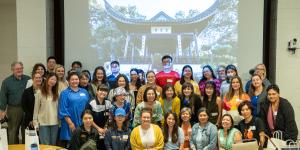On September 29, 2024, the USC U.S.-China Institute hosted a workshop at the Huntington’s Chinese garden, offering K-12 educators hands-on insights into using the garden as a teaching tool. With expert presentations, a guided tour, and new resources, the event explored how Chinese gardens' rich history and cultural significance can be integrated into classrooms. Interested in learning more? Click below for details on the workshop and upcoming programs for educators.
Hukou Reform and Rural Dispossession in China
The 21st Century China Program at UCSD presents a talk by Joel Andreas on the evolution of the hukou system, focusing on access to rural land and considering the implications for the rural population of the current shift from hukou-based to market-based land rights.
Where
Since the 1950s, the Chinese government has allocated resources through a household registration system, called “hukou,” dividing the population into urban and rural residents with different — and very unequal — sets of entitlements. For decades urban residents were guaranteed employment and an array of social services, while rural residents were guaranteed access to land, but little else.
In recent decades hukou reforms, together with other market reforms, broke down exclusionary mechanisms that underpin the old system. Early hukou reforms opened urban labor markets, giving rural migrants access to city jobs, while more recent reforms have opened rural land markets. These recent reforms facilitated land concentration and provided access to real estate developers and agribusiness companies, in line with the government’s current agenda of promoting rapid urbanization and large-scale agriculture.
Because most scholarship on hukou reform has focused on urban entitlements, it has missed this fundamental shift, which has turned the reform into a weapon of rural dispossession. In his talk, professor Joel Andreas will reexamine the evolution of the hukou system, focusing on access to rural land and considering the implications for the rural population of the current shift from hukou-based to market-based land rights.
Speaker
Joel Andreas is an associate professor of sociology at Johns Hopkins University. His research interests include political contention, social inequality and social change in contemporary China. His 2009 book “Rise of the Red Engineers: The Cultural Revolution and the Origins of China’s New Class” analyzes the contentious process through which two mutually hostile groups — the poorly educated peasant revolutionaries who seized power in 1949 and China’s old educated elite — coalesced to form a new dominant class.
Andreas is currently investigating changing modes of industrial governance in China between 1949 and the present, as well as the capitalist transformation of the Chinese economy over the last two decades, focusing on the dislocation and dispossession of workers and peasants through industrial restructuring and the scaling up of agriculture.
Featured Articles
Happy Lunar New Year from the USC US-China Institute!
Events
Ying Zhu looks at new developments for Chinese and global streaming services.
David Zweig examines China's talent recruitment efforts, particularly towards those scientists and engineers who left China for further study. U.S. universities, labs and companies have long brought in talent from China. Are such people still welcome?






